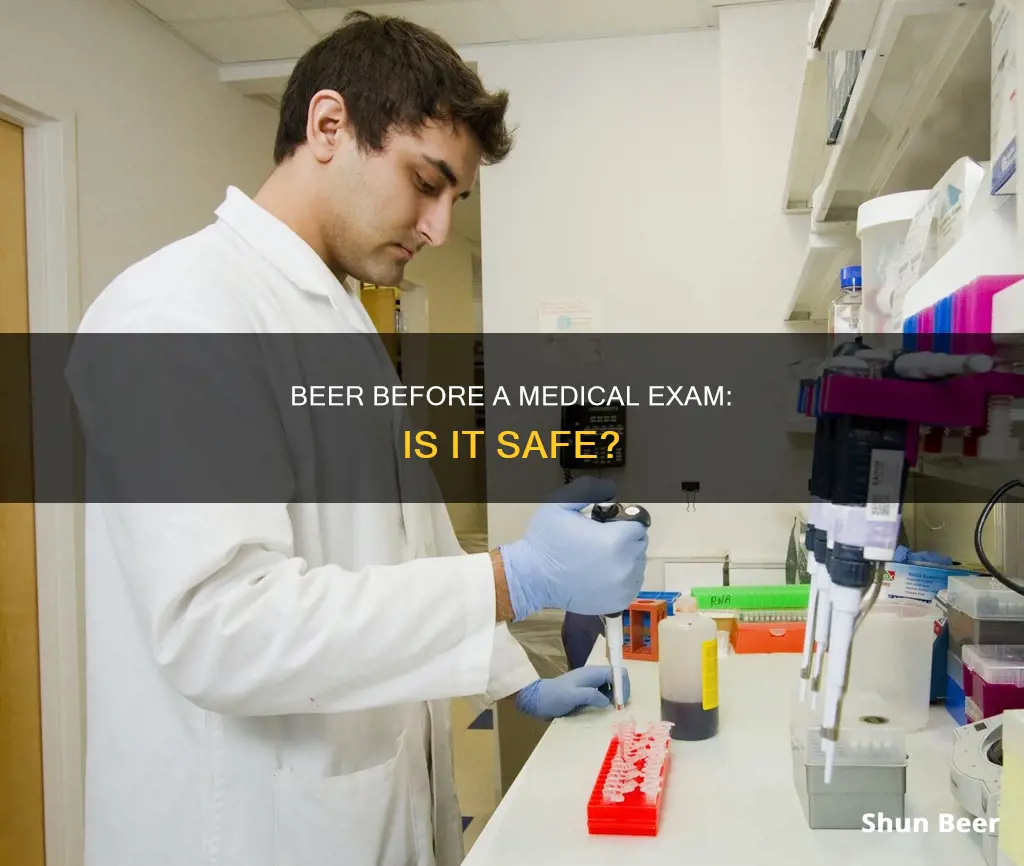
Drinking alcohol before a medical exam is not recommended as it can affect the accuracy of certain tests. Alcohol can interfere with blood tests by altering glucose levels, enzyme levels in the liver, the clotting ability of the blood, and the pH balance of the blood. These interferences can impact the results of blood sugar, liver function, coagulation, and electrolyte tests. To ensure the most accurate results, it is generally recommended to avoid consuming alcohol for at least 24 hours before a blood test. However, the specific test and the amount of alcohol consumed also play a role in determining the potential impact on test results. For instance, a standard blood test can detect alcohol up to 12 hours after consumption, while the body may take up to 25 hours to fully metabolize and clear a moderate amount of alcohol.
What You'll Learn

How much alcohol can you drink before a blood test?
It is generally recommended to avoid drinking alcohol before a blood test, especially a fasting blood test, as it can affect the accuracy of the results. Alcohol can interfere with blood sugar levels, enzyme and fat levels in the liver, and the pH balance of the blood, which can impact the results of a range of tests.
A standard blood test can detect alcohol up to 12 hours after consumption, and it can take the body up to 25 hours to fully metabolise and clear a moderate amount of alcohol from your system. Therefore, it is advisable to refrain from consuming alcohol for at least 24 hours before a blood test to ensure the most accurate results. If you have consumed a small amount of alcohol within this time frame, it is best to discuss this with your healthcare provider, who can advise you based on the specific test and the amount you have drunk.
If you are a heavy drinker, it is important to be honest with your healthcare provider, as they may recommend abstaining from alcohol for a longer period before the test. Additionally, they can provide resources and guidance to help you reduce your alcohol intake, as heavy alcohol consumption can lead to serious health problems, including liver damage and an increased risk of certain cancers.
In summary, the amount of alcohol that can be consumed before a blood test depends on the specific test and the individual's drinking habits. However, it is always best to consult with a healthcare professional if you have any concerns about the potential impact of alcohol on your blood test results.
Beer and Gum Grafts: What You Need to Know
You may want to see also

How does alcohol affect blood test results?
Blood tests are an important part of your overall health plan. They can help doctors evaluate organ function, diagnose diseases, and check whether medicines are working. However, certain things you do before a blood test can affect the outcome.
Alcohol consumption is one such factor that can impact your blood test results. Alcohol contains ethanol, a psychoactive substance that can remain in the bloodstream for several days after consumption. Even the smallest amounts of alcohol can alter enzyme levels and have an impact on your mood, confidence, and socialisation skills. Therefore, it is generally recommended to avoid alcohol before a blood test.
Alcohol can disrupt the balance of glucose regulation in the body and impair the liver's ability to produce glucose, which may lead to hypoglycaemia. It can also alter enzyme activity and fat metabolism in the liver, affecting various blood test components and leading to inaccurate readings, especially in tests that rely on liver function markers and lipid levels.
If you are required to fast before your blood test, it is best to refrain from consuming alcohol for at least 24 hours beforehand. This will help ensure that your blood test results are not influenced by temporary changes and provide a clearer picture of your health.
In summary, alcohol consumption can affect blood sugar levels, enzyme levels, and fat metabolism. It is important to abstain from alcohol before a blood test, especially if it involves liver enzyme tests, to ensure accurate results and a clear diagnosis.
Beer and Steroid Shots: What's the Verdict?
You may want to see also

What happens if you drink alcohol before a medical exam?
Drinking alcohol before a medical exam is not recommended as it can interfere with the accuracy of certain tests. Alcohol can affect the levels of certain substances in the blood, such as glucose levels, which can impact the results of a blood sugar test. It can also affect the levels of certain enzymes in the liver, which can impact the results of liver function tests. In addition, alcohol can alter the pH balance of the blood, affecting the accuracy of an electrolyte test.
The effects of alcohol on the body can also impact the results of other medical exams. For example, alcohol can cause dehydration, which can make it difficult for a phlebotomist to draw blood. Alcohol can also increase protein levels in the urine, which may be indicative of kidney problems.
To ensure the most accurate results, it is generally recommended to abstain from alcohol for at least 24 hours before a medical exam, especially if the exam includes blood work. However, it is important to note that the specific effects of alcohol on test results may vary depending on the type of test and the amount of alcohol consumed. If you have consumed alcohol before a medical exam and are concerned about the potential impact, it is best to consult with a healthcare professional.
In addition to affecting test results, drinking alcohol before a medical exam can also be counterproductive to the overall purpose of the exam, which is to assess your health and identify any potential issues. Alcohol consumption can be a factor in various health conditions, so it is advisable to refrain from drinking before an exam to provide an accurate representation of your health status.
Bees and Beer: A Buzzing Friendship?
You may want to see also

How long before a medical exam should you stop drinking alcohol?
It is generally recommended that you stop drinking alcohol at least 24 hours before a medical exam. This is because alcohol can affect the accuracy of certain blood tests, such as blood sugar and liver function tests, by interfering with the levels of substances in the blood, including glucose and liver enzymes. Alcohol can also affect the clotting ability of the blood and alter the pH balance, which can impact the results of coagulation and electrolyte tests, respectively.
If you are a heavy drinker, it is important to be honest with your healthcare provider about your alcohol consumption. They may recommend that you abstain from alcohol for a longer period before the blood test to ensure the most accurate results. Additionally, heavy alcohol consumption can lead to serious health problems, including liver damage and an increased risk of certain cancers, so it is important to seek help to reduce your alcohol intake.
It is worth noting that some people believe that drinking water can help flush alcohol out of the system, but this is a myth. Water is important for preventing dehydration, as alcohol acts as a diuretic, but it does not remove alcohol from the body.
In summary, to ensure the most accurate results for your medical exam, it is best to abstain from alcohol for at least 24 hours beforehand, and if you are a heavy drinker, consider abstaining for a longer period or seeking advice from your healthcare provider.
Ginger Beer and Dogs: Is It Safe to Share?
You may want to see also

What are the immediate effects of drinking beer before a medical exam?
Drinking beer before a medical exam can have several immediate effects on your body that may impact the accuracy of the test results. Here are some of the immediate effects of drinking beer before a medical exam:
- Increased diuresis: Beer acts as a diuretic, which means it increases the production of urine. This can be particularly inconvenient during a test, as you may need to use the restroom frequently, causing distractions and interruptions.
- Impaired mental functioning: Even a small amount of alcohol can impair your mental functioning. This can affect your ability to think clearly, concentrate, and recall information during the exam.
- Altered blood sugar levels: Alcohol consumption can disrupt the balance of glucose regulation in the body, leading to potential hypoglycemia. This can impact the accuracy of blood sugar tests, which are often part of medical exams.
- Changes in liver enzyme activity: Drinking beer can alter enzyme activity and fat metabolism in the liver. This can affect the results of liver function tests, which are commonly included in medical exams.
- Increased nervousness: While a small amount of alcohol may help calm your nerves, it can also have the opposite effect, leading to increased nervousness and anxiety.
- Elevated heart rate and blood pressure: Alcohol can stimulate the nervous system, leading to an increased heart rate and blood pressure. This can be particularly problematic if the medical exam includes measurements of these vital signs.
It is important to note that the immediate effects of drinking beer before a medical exam can vary depending on the amount consumed, individual differences in metabolism, and other factors. To ensure the most accurate test results, it is generally recommended to abstain from alcohol consumption for at least 24 hours before a medical exam.
Skunked Beer: Is It Safe to Drink?
You may want to see also
Frequently asked questions
It is not recommended to drink beer or any alcoholic beverage before a medical exam. Alcohol can affect the accuracy of certain blood tests by altering the levels of substances in the blood, such as glucose and liver enzymes. To ensure the most accurate results, it is generally advised to refrain from consuming alcohol for at least 24 hours before a blood test.
Alcohol consumption can disrupt the balance of glucose regulation in the body, impairing the liver's ability to produce glucose and potentially leading to hypoglycemia. It can also alter enzyme activity and fat metabolism in the liver, affecting blood test components that rely on liver function markers and lipid levels. Additionally, alcohol can impact the clotting ability of the blood and alter the pH balance, which can affect coagulation and electrolyte test results.
Alcohol can be detected in a standard blood test for up to 12 hours after consumption. However, it may take the body up to 25 hours to fully metabolize and clear a moderate amount of alcohol. For fasting blood tests, it is recommended to refrain from consuming alcohol for at least 24 hours beforehand. If you are a heavy drinker, it is important to be honest with your healthcare provider, as they may advise a longer period of abstinence to ensure accurate results.







